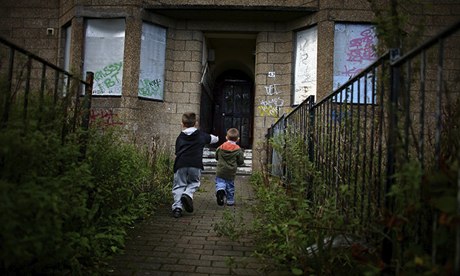Children's Society finds more than half of UK's 3m poor children complain of cold and 76% often worry about family finances

Children play in a run-down street in the
deprived Govan area of Glasgow. Photograph: Jeff J Mitchell/Getty
Images
More than half of all poor
children in the UK are
living in homes that are too cold, and around a quarter said their home suffered
from damp or mould, a
survey published by the Children's Society indicates.
There are over three million
children living in poverty in the UK, a
figure that is predicted to rise. Poverty remains stigmatising, according to the
survey of 2,000 children aged between 10 and 17, published on Tuesday.
Matthew Reed, the chief executive of the Children's Society, said: "For millions of children up and down the country, poverty is a grinding reality – and it is getting worse. Many families are facing stark and unacceptable choices, like heat or eat. This is disgraceful in any country, especially in one of the world's richest."
The charity is launching a children's commission on poverty, to record the experiences of children living beneath the breadline.
A separate survey published on Tuesday shows that greater numbers of disadvantaged families are using the services offered by local children's centres, despite continuing local government funding cuts.
The research published by the charity 4Children, which
runs family and children's services across Britain, revealed that although 73%
of children's centres say they worked with an increasing number of families over
the past 12 months, 66% are operating on a decreased budget compared with the
previous year. About a third expect to be able to provide fewer services in a
year's time.
"Local authorities are under extreme financial pressure to make tough decisions," she said. But "rather than contemplating reductions and closures, we should instead seize the opportunity to make the most of centres' growing potential to help avert family crises."
A spokesman for the Department for Work and Pensions said: "Despite paying out £170bn in tax credits alone, the previous government failed to meet their target to halve child poverty by 2010 and far too many children were left behind.
"While this government is committed to eradicating child poverty, we are taking a new approach by finding the root causes of the problem and tackling these. We have successfully protected the poorest from falling behind and last year we saw a reduction of 100,000 children in workless poor families.
"Our welfare reform programme and tax changes will further increase work incentives and improve the lives of some of the poorest families in our communities. The introduction of the universal credit will make three million households better off and lift up to 250,000 children out of poverty."
Guardian